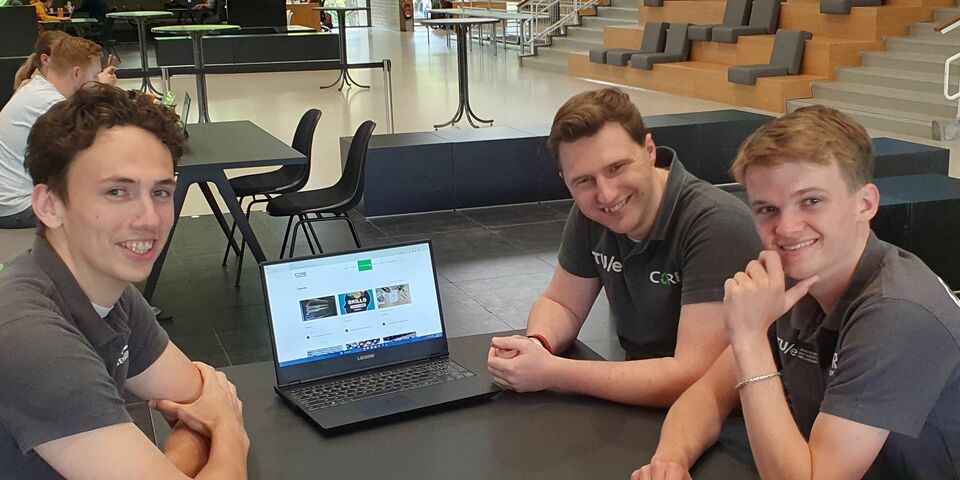Student team CORE develops its own education
‘Why don’t you join a student team, you’ll learn so much there’ is a phrase you often hear. But isn’t it a difficult enough task to find out what you can learn where, and from whom? That is why student team CORE decided to launch a platform consisting of videos, quizzes and tests that will help those with a hunger for learning find their way through a jungle of teaching elements. The platform is initially intended for team members only, but CORE hopes to rapidly expand it to other student teams, even from outside TU/e. CEO Dirk van Meer calls it the CORE campus.
“A student team definitely is a good environment if you want to learn a lot,” Van Meer says, “but it is highly unstructured. There’s no footing, and in large teams in particular, the initiative usually lies with just a few individuals. That leads to burn-outs among managers, and that’s exactly the opposite of what you want to teach them.” He says that the 20/80-rule that applies to major organizations – 20 percent of people carry out 80 percent of the work – is closer to a 10/90-rule within student teams. “I want to change those percentages by launching a clear platform.”
That idea didn’t appear out of thin air. Van Meer (23) has for years supervised large student teams – such as Solar Team Eindhoven, InMotion and TechUnited – and acted as team supporter at TU/e innovationSpace, together with three other students. “At innoSpace, I’ve noticed that the focus was primarily on Challenge-Based Learning, but not so much on practices and methods. It’s true that students can go online to search for information about how to solve problems, but there’s so much information on the internet. Therefore, a course about how to search for information is essential, in my view. That’s why we decided to develop a system that allows students to gain knowledge free of charge: the CORE campus. And you can acquire that knowledge whenever you want. No more ninety-minute lectures, but short explanations in videos of two or three minutes with adequate search terms.”
Internship assignment
Tom Schenning and Max Greefhorst (left and right in the main photo) are interns from the Entrepreneurship and retail management program at Avans in Breda. Their internship assignment is to build the platform that will allow the CORE campus to operate. “It was difficult for new CORE members to get to work immediately,” Schenning was told. “With this new platform, with its variety of courses, that won’t be a problem anymore.” Personally, he would like to take a course on how to ‘secure a lead,’ an instruction video that teaches you how to turn abstract contact details into actual clients. Greefhorst could use a video about an efficient social media campaign.
How does the platform get its content? “Unlike other student teams, CORE has many coaches in its network. These experts, who are already involved with CORE, will provide the learning content. That content can cover a variety of fields, including AI, marketing, sales, et cetera,” Van Meer says. “We collect the questions students have and search for the coaches, so that the modules meet the learning objectives in an accessible way. The education needs to meet the demands of students, not the other way around. That is why we make short videos and quizzes.”
No interference
The modules that pose the greatest challenges in terms of finding the right content, are the ones furthest removed from technological knowledge. CORE knows exactly how to recycle e-waste, but for legal knowledge, for example, the team has to search elsewhere. “It’s difficult to find parties in this region that share open knowledge in this field. It’s not about the definition of a patent, but about when to use a patent. A kind of The Gate online.” Van Meer deliberately didn’t seek collaboration with the Gate, which has an Academy since recently. Van Meer: “We want to keep our CORE campus outside TU/e because of the tempo in which we want to develop things. The great thing about a student team is that you can build a car within a year, because no one interferes. We too operate without the involvement of all kinds of people.”
CORE is currently busy screening the coaches, a task for which the team likes to take responsibility. “We need a lot of people and the offer is large enough, but not everyone is suitable. A coach needs to have a feeling for students. I often get offers from retirees who want to ensure that their knowledge won’t get lost. Hans Fischer, for example, TU/e alumnus and former CEO at Tata Steel, is one of CORE’s coaches.”
Test phase
During the first six months, the CORE campus will remain private. This means that the platform will be accessible only to the team’s current 45 members, probably as of September. “Think of it as a test phase, during which we will eliminate the teething troubles. Something is bound to go wrong,” Van Meer predicts. “But it’s easier to process the complaints of 45 people than of four hundred users simultaneously. I happen to be in talks already with Summa and Avans about the possibility of making the platform accessible to their students as of January 2024.”


Discussion